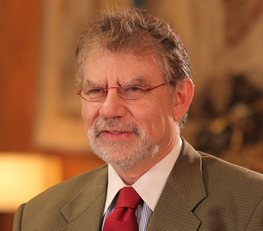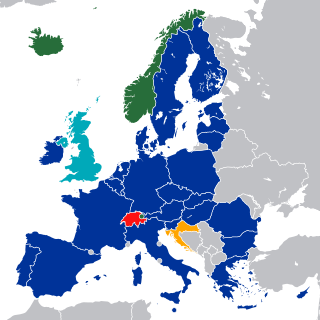
The Community acquis or acquis communautaire, sometimes called the EU acquis and often shortened to acquis, is the accumulated legislation, legal acts, and court decisions which constitute the body of European Union law. The term is French: acquis meaning "that which has been acquired or obtained", and communautaire meaning "of the community".

The European Court of Justice (ECJ), officially just the Court of Justice, is the supreme court of the European Union in matters of European Union law. As a part of the Court of Justice of the European Union it is tasked with interpreting EU law and ensuring its equal application across all EU member states.

The General Court (EGC) is a constituent court of the Court of Justice of the European Union. It hears actions taken against the institutions of the European Union by individuals and member states, although certain matters are reserved for the European Court of Justice. Decisions of the General Court can be appealed to the Court of Justice, but only on a point of law. Prior to the coming into force of the Lisbon Treaty on 1 December 2009, it was known as the Court of First Instance.
International human rights law (IHRL) is the body of international law designed to promote human rights on social, regional, and domestic levels. As a form of international law, international human rights law are primarily made up of treaties, agreements between sovereign states intended to have binding legal effect between the parties that have agreed to them; and customary international law. Other international human rights instruments, while not legally binding, contribute to the implementation, understanding and development of international human rights law and have been recognized as a source of political obligation.

The Official Journal of the European Union is the official gazette of record for the European Union (EU). It is published every working day in all of the official languages of the member states. Only legal acts published in the Official Journal are binding.

The Law of the Soviet Union was the law as it developed in the Soviet Union (USSR) following the October Revolution of 1917. Modified versions of the Soviet legal system operated in many Communist states following the Second World War—including Mongolia, the People's Republic of China, the Warsaw Pact countries of eastern Europe, Cuba and Vietnam.

A strikebreaker is a person who works despite an ongoing strike. Strikebreakers are usually individuals who were not employed by the company prior to the trade union dispute, but rather hired after or during the strike to keep the organization running. "Strikebreakers" may also refer to workers who cross picket lines to work.

Joseph Halevi Horowitz Weiler is a South African-American academic, currently serving as European Union Jean Monnet Chair at New York University Law School and Senior Fellow of the Minda de Gunzburg Center for European Studies, Harvard.

The European Union Civil Service Tribunal was a specialised court within the Court of Justice of the European Union. It was established on 2 December 2005. It ceased to exist on 1 September 2016.
The primacy of European Union law is an EU law principle that when there is conflict between European law and the law of Member States, European law prevails; the norms of national law have to be set aside. This principle was developed by the European Court of Justice, and, as interpreted by that court, it means that any norms of European law always take precedence over any norms of national law, including the constitutions of member states. Although national courts generally accept the principle in practice, most of them disagree with this extreme interpretation and reserve the right, in principle, to review the constitutionality of European law under national constitutional law.

Koen Lenaerts, Baron Lenaerts is the President of the Court of Justice of the European Union. He is also a Professor of European Law at the Katholieke Universiteit Leuven and was a member of the Coudenberg group, a Belgian federalist think tank.

In the European Union (EU), enhanced cooperation is a procedure where a minimum of nine EU member states are allowed to establish advanced integration or cooperation in an area within EU structures but without the other members being involved. As of October 2017 this procedure is being used in the fields of divorce law, patents, property regimes of international couples, and European Public Prosecutor and is approved for the field of a financial transaction tax.
Legal certainty is a principle in national and international law which holds that the law must provide those subject to it with the ability to regulate their conduct.
The Common Market Law Review is a bi-monthly, peer-reviewed law journal covering European Union law. It is the oldest dedicated journal on EU law, and was founded in 1963 by the Europa Institute of Leiden University in cooperation with the British Institute of International and Comparative Law, London. It is published by Kluwer Law International. The journal publishes articles, case notes and book reviews in English.

The University of Missouri School of Law is the law school of the University of Missouri. It is located on the university's main campus in Columbia, forty minutes from the Missouri State Capitol in Jefferson City. The school was founded in 1872 by the Curators of the University of Missouri. Its alumni include governors, legislators, judges, attorneys general, and law professors across the country. According to Mizzou Law's 2016 ABA-required disclosures, 82 percent of the 2016 class obtained full-time, long-term, JD-required employment nine months after graduation.
Judicial review is a process under which executive or legislative actions are subject to review by the judiciary. A court with authority for judicial review may invalidate laws, acts and governmental actions that are incompatible with a higher authority: an executive decision may be invalidated for being unlawful or a statute may be invalidated for violating the terms of a constitution. Judicial review is one of the checks and balances in the separation of powers: the power of the judiciary to supervise the legislative and executive branches when the latter exceed their authority. The doctrine varies between jurisdictions, so the procedure and scope of judicial review may differ between and within countries.

The Court of Justice of the European Union (CJEU) is the judicial branch of the European Union (EU). Seated in the Kirchberg quarter of Luxembourg City, Luxembourg, this EU institution consists of two separate courts: the Court of Justice and the General Court. From 2005 to 2016 it also consisted of the Civil Service Tribunal. It has a sui generis court system, meaning "of its own kind", and is a supranational institution.

Scots law is the legal system of Scotland. It is a hybrid or mixed legal system containing civil law and common law elements, that traces its roots to a number of different historical sources. Together with English law and Northern Irish law, it is one of the three legal systems of the United Kingdom.
Parliamentary sovereignty is a concept in the constitutional law of some parliamentary democracies. It holds that the legislative body has absolute sovereignty and is supreme over all other government institutions, including executive or judicial bodies. It also holds that the legislative body may change or repeal any previous legislation and so it is not bound by written law or by precedent.












